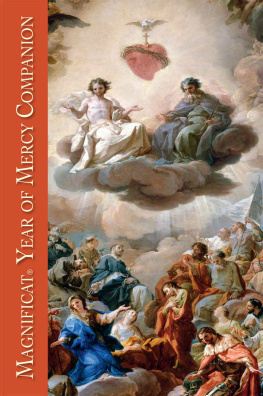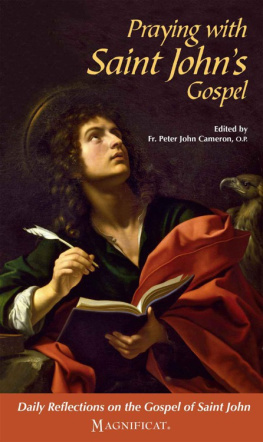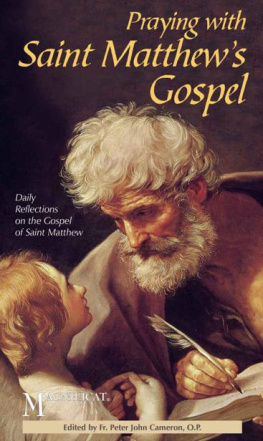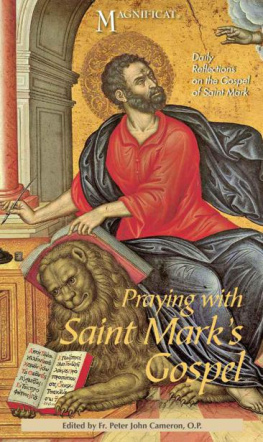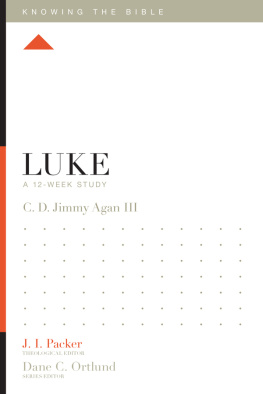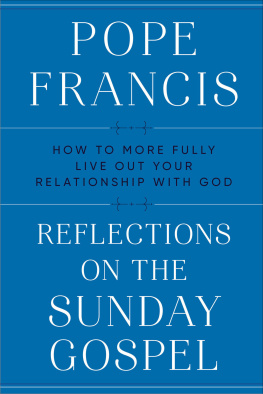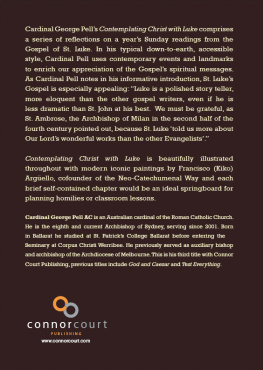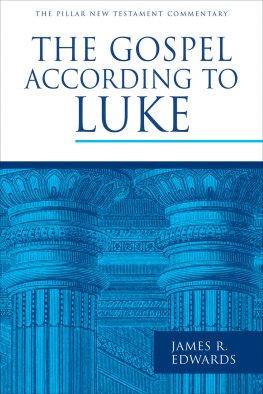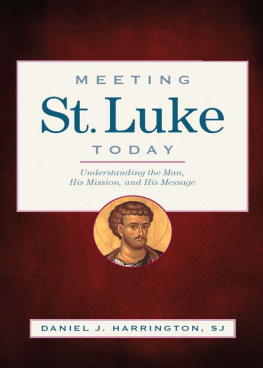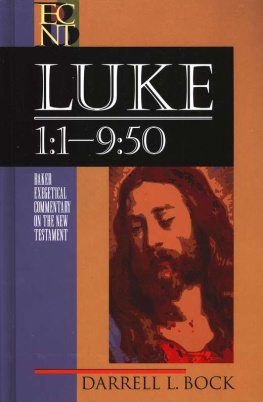
Foreword
Father Peter John Cameron, o.p.
A t the center of the Gospel of Luke stands arguably the worlds most famous parable: the parable of the prodigal sona parable told only by the Evangelist Saint Luke. Perhaps the most shocking thing about this progressively shocking parable is that,upon welcoming his wayward son home, the father commands his servants, "Quickly bring the finest robe and put it on him" (Lk 15:22). Not only does the father receive the boy back with unconditional compassion, but he elevates him, investing him with a dignity and authority identical to his own. A servant busy about his duties on the estate glancing quickly might mistake the prodigal for the master.
Christ's clothing
The significance of the prodigals "finest robe" appears when viewed against the role Christ's clothes play in Luke. After the birth of Jesus, the Blessed Virgin Mary "wrapped him in swaddling clothes" (Lk 2:7). When the angel of the Lord appeared to the shepherds and announced, "Today in the city of David a savior has been born for you who is Messiah and Lord," he also provides the shepherds with a sign by which to recognize Jesus when they go to see him: "This will be a sign for you: you will find an infant wrapped in swaddling clothes" (Lk2:ll-12).
What gives the hemorrhaging woman the chutzpah to draw close to Christ so as to "steal" a healing is that he is wearing a cloak trimmed with fringe easy anonymously to touch (Lk 8:44). What emblazons the event of the Transfiguration on the minds of the disciples who witnessed it is the fact that Jesus' "clothing became dazzling white" (Lk 9:29)a foreshadowing of the glory that will array the risen Lord. How startling it must have been for those same disciples if they managed to glimpse their captured Master as he went from Herod's court to Pontius Pilate. For after Herod and his soldiers treated Jesus "contemptuously and mocked him," they clothed him "in resplendent garb" (Lk 23:11)garb alarmingly alike that of the transfigured Christ.
What fills Peter with expectant amazement on Easter morning as he stoops down to peer into Christ's empty tomb is that he "saw the burial cloths alone" (Lk 24:12). What hope just the clothing of Jesus Christ generates!
The need for salvation
The Evangelist Luke likes to reference clothing in order to "expose" our need for salvation. For example, what strikes us as especially appalling and terrifying about the possessed Ger-asene man who lived among the tombstones is that "for a long time he had not worn clothes" (Lk 8:27). Conversely, Saint Luke pinpoints the distinctive decadence of the rich man oblivious to the beggar Lazarus by this detail: he "dressed in purple garments and fine linen" (Lk 16:19). Our Lord reveals us to ourselvesand our temptation to let anxiety dominate our lives with the observation that "not even Solomon in all his splendor was dressed" like the glorious wild flowers. And "if God so clothes the grass in the field that grows today and is thrown into the oven tomorrow, will he not much more provide for you?" (Lk 12:27-28).
Similarly, Jesus rails against the scribes "who like to go around in long robes" (Lk 20:46). Maybe this is why, when Jesus summons the Twelve and sends them out with authority over all demons and to cure diseases, he includes the specific instruction, "Take nothing for the journey, neither walking stick, nor sack, nor food, nor money, and let no one take a second tunic" (Lk 9:3). The Twelve are not like the self-adoring scribes or the self-absorbed rich man; their simple, spare dressfor which they have no sparedemonstrates their reliance on the One they preach.
The counsel inscribed by Saint Luke finds confirmation in the letters of Saint Paul. Gospel holiness entails a definite divesting: "You have taken off the old self with its practices" (Col 3:9). This is not a merely mystical endeavor; it assumes concrete, rlesh-and-blood form. For instance, "whoever has two cloaks should share with the person who has none" (Lk 3:11). Also, "from the person who takes your cloak, do not withhold even your tunic" (Lk 6:29). Christian disciples acknowledge their need for a Redeemer like the people "spreading their cloaks on the road" (Lk 19:36) to welcome Christ's victorious entry into Jerusalem. What we do with our clothing reveals the disposition of our heart toward Christ.
However, this stripping of our old behaviors does not leave us naked like the Gerasene demoniac. As God's chosen ones, we put on "heartfelt compassion, kindness, humility, gentleness, and patience" (Col 3:12). "For all of you who were baptized into Christ have clothed yourselves with Christ" (Gal 3:27)attire that far outstrips the resplendence of the rich man, Solomon, or the scribes.
Our experience reminds us how much we resemble the man who fell victim to robbers as he went down from Jerusalem to Jericho: "They stripped and beat him and went off leaving him half-dead" (Lk 10:30). They beat him after they stripped him so as not to stain with blood the clothing they were robbing. Whatever puts us in the state of being half-deadworldly persecution...our problems, fears, and sufferings...the cruelty or inconsiderateness of others... our own sinsonly makes us languish all the more for the Good Samaritan (another parable narrated uniquely by Luke). In our woundedness we wait for him, "for he has clothed me with a robe of salvation,/ and wrapped me in a mantle of justice" (Is 61:10).
Clothed with the finest robe
Getting back to the prodigal son: there is something particularly despicable about him. In demanding his inheritance and departing, he treats his father as if he were already dead and he in effect disowns his family. By choosing to do his squandering in a distant land, he turns his back on his ethnicity, his people. And by hiring himself out to feed pigs, he spurns his religion.
All the same, when the prodigal son at last appears on the horizon, the father rushes to get him robed. The superabundance of the fathers love may call to mind the Old Testament story of Joseph whose father Jacob loved him so much of all his sons that he made for him a long robe (Gn 37:3). The two fathers have something else in common: when the son gets separated from the fatherJoseph through the exile brought on by his brothers' betrayal, and the prodigal through his self-exile brought on by betraying his own heartthe father lives for the day of their reunion.
The point is this: no matter how lost we may get because of our own selfishness and defiance and rebellion toward God... no matter how awful the ruin we bring upon ourselves through self-indulgence and our insistence on doing things our way... no matter how wasted, squalid, and squandered the sum of our life may seem, the Father waits with an aching heart to clothe us with the finest robe. That robe, says Saint Augustine, is the dignity which Adam lost.
No wonder, then, that our risen Saviors final words in the Gospel of Luke before he ascends into heaven are these: "I am sending the promise of my Father upon you.... Stay in the city until you are clothed with power from on high" (Lk 24:49). Clothe me, Lord, with the Fathers own love so that I may be filled with his compassion and tenderness and forgiveness toward others. May my life overflow with mercy. Clothed with his love, let me leave behind whatever does not matter. Free me from my guilt, my shame, my regrets. May I be always vigilant, keeping watch for those snared in their sins, those trapped in their hurts, those desperate for somewhere to turn. May I rush to them with the promise of hope, a new beginning. Help me be the one to make others feel so loved that they never want to leave you again.
INTRODUCTION
Next page

